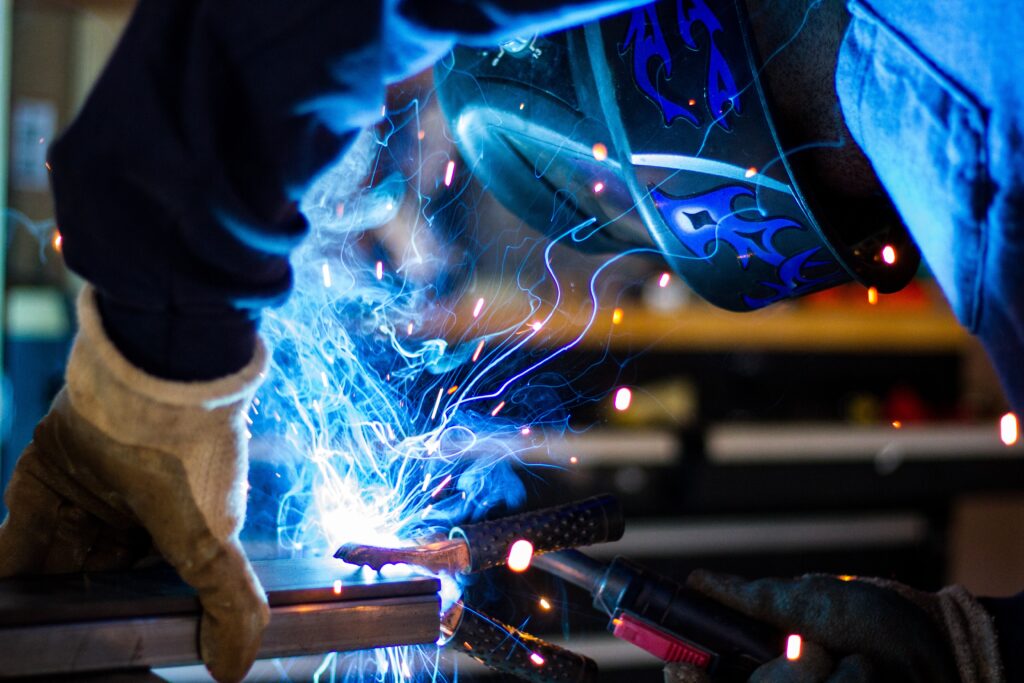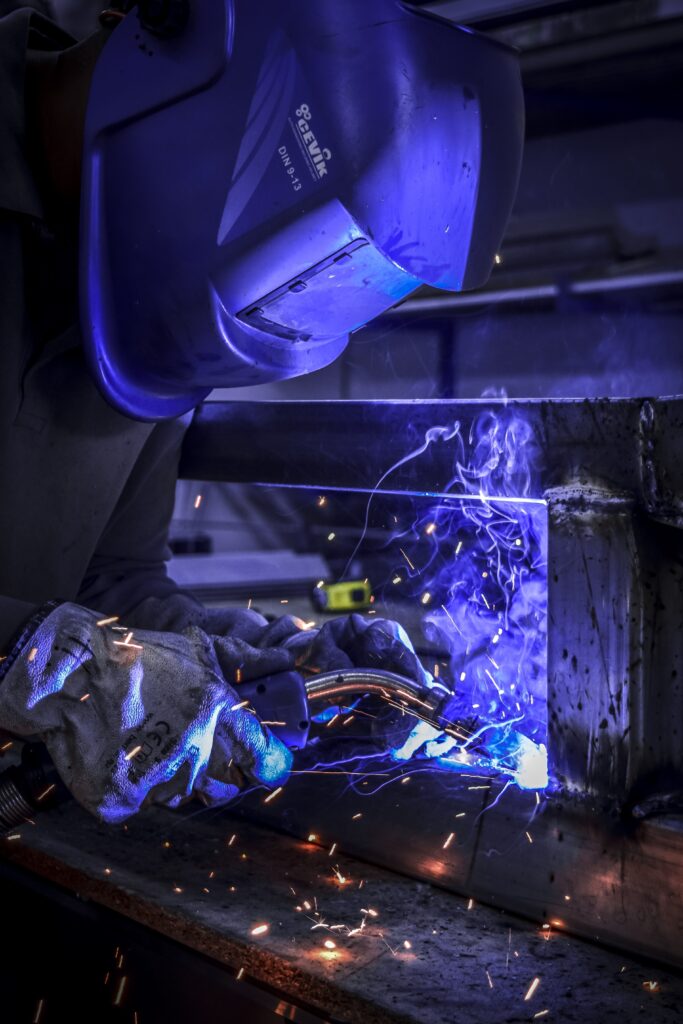Embark on a journey to examine the intriguing world of welding! In “Is welding a declining job?”, you’ll discover the current state of the welding profession, analyzing trends and scrutinizing statistics. This detailed exploration will aid you in forming an informed opinion on whether this ancillary trade is tapering or thriving.

Current State of the Welding Industry
The current state of the welding industry is fascinating – a blend of traditional techniques with a rush towards modernisation. It’s ever-evolving and is affected by various factors, from retirement rates to supply and demand dynamics.
Supply and Demand in the Welding Industry
You may have heard about supply-demand imbalances in many job sectors, but the welding industry presents a unique scenario. There’s a high demand for skilled welders, especially due to the retiring workforce and the booming construction and manufacturing sectors. However, there’s not enough supply of trained professionals to meet this demand. This mismatch is affecting the overall health of the industry.
Retirement Rates in the Welding Industry
A significant factor impacting the welding industry is the high retirement rate. Why is this essential? A large portion of the current welders are ageing, with many of them retiring or on the brink of retirement. Hence, the industry’s dynamics are evolving rapidly as there’s an increasing need for younger generations to fill these vacancies.
General Employment Trends in the Sector
Interestingly, the welding industry has seen steady job growth over the past few years. Despite fears of automation and job displacement, there are still many job opportunities due to the persistent demand for welding services in various sectors. However, hiring trends have also shifted towards more specialized welders with multiple skill sets or certifications.
Historical Trends in the Welding Job Market
It’s equally important to look back at history and analyze how past trends have shaped the welding job market.
Changes in the Demand for Welders Over the Decades
Historically, the demand for welders has ebbed and flowed with economic and industrial trends. With the rise of industrialization and urbanization, and especially during and after wartimes, the demand for welders saw a significant surge. More recently, global economic growth and infrastructure development in emerging economies have contributed to a healthy demand for welders.
Shifts in the Type of Welding Jobs
The type of welding jobs has also evolved over the decades. Years ago, the need was mainly for structural steel welders, while currently, the demand includes a wider range of roles – from underwater welding to aerospace welding. This shift has created a need for more specialized skills and extra training.
Effect of Technological Advancements on Job Availability
Technological advancements have undoubtedly influenced the welding industry, leading to a change in the types of jobs available. Automation and robotics have eliminated some roles. Yet, on the flip side, they have also created new opportunities for those who can navigate these advanced technologies.

Impact of Automation on Welding
Automation isn’t just a buzzword – it presents both challenges and opportunities in the welding sector.
Role of Robotics in Welding Tasks
Robotics has begun to play a significant role in handling repetitive welding tasks in large manufacturing units. This shift not only increases efficiency but also enhances safety by reducing human exposure to hazardous welding environments.
Job Displacement Due to Automation
While automation and robotics have their benefits, they also have a significant downside – job displacement. With robots becoming capable of handling tasks previously done by humans, many welders fear losing their jobs.
Opportunities for Welders in Automated Environments
On a more positive note, automation also means new opportunities for welders. Those skilled in programming and operating the automated machines are in high demand. So, you can see this as a chance to learn new skills and adapt to the changing industry dynamics.
Welding Industry Projections
Looking ahead, we can identify some critical trends likely to shape the welding industry’s future.
Future Job Outlook for Welders
Despite automation fears, the job outlook for welders remains relatively positive. The demand for skilled welders is expected to grow, especially with an ageing workforce and upcoming large-scale infrastructure projects.
Region-wise Forecasts
The future of welding also seems brighter in specific regions, particularly those with significant industrialization and infrastructure development. Areas like Asia-Pacific and the Middle East are expected to offer strong job prospects for welders.
Retirement and Replacement Needs
With a large chunk of the current workforce near retirement, the welding industry will need a new generation of well-trained welders. This transition might offer great career opportunities for aspiring welders, provided they undergo the right training and certification.

Skills Gap in the Welding Industry
A major issue that the welding industry is grappling with right now is the skills gap.
Need for Skilled Welders
There’s an urgent need for skilled welders in the industry. With the evolution of technology and the transition towards advanced welding techniques, employers now seek welders with specialized skills and certifications. However, there’s a shortage of such professionals.
Impact of the Skills Shortage on Job Availability
The shortage of skilled welders is impacting job availability. A lot of jobs are going vacant as employers struggle to find candidates who meet their skill requirements. As such, aspiring welders who can acquire these skills will find ample job opportunities.
Efforts to Address the Skills Gap
The good news is, efforts are underway to address this skills gap. Vocational training centers, community colleges, and industry employers are offering welding certification programs, curriculum, and apprenticeships to train the next generation of skilled welders.
Welding Opportunities in Alternative Sectors
Welding isn’t restricted to traditional fields and offers opportunities in alternative areas as well.
Role of Welders in Renewable Energy
As the world shifts towards clean and renewable energy, welders find this sector increasingly attractive. They are essential for constructing wind turbines, solar panels, and other renewable energy infrastructure.
Welding Jobs in the Manufacturing Sector
The manufacturing sector continues to rely heavily on welding for various tasks. From automobile assembly to electronic device manufacturing, welders play a crucial role in this sector.
Offshore Welding Opportunities
For those who can withstand the demands and risks, offshore welding offers high-paying opportunities. These welders work on oil rigs, shipyards, or undersea projects and are compensated well for their skills and the challenging work environment.
Impact of Economic Factors on Welding Jobs
Economic factors largely influence the state of welding jobs.
Effect of Global Economic Downturns on the Welding Sector
Just like other sectors, welding is susceptible to global economic downturns. During such periods, businesses scale down, construction is reduced, and in turn, the demand for welders drops.
Impact of Manufacturing Industry Trends on Welding Jobs
The welding industry is closely tied with the manufacturing sector. As a result, trends in this sector, whether it’s a rise in automation or outsourcing, significantly impact welding jobs.
Dependency on the Construction and Infrastructure Sector
The construction and infrastructure sector is another strong influencer of welding jobs. When these sectors boom, so does the demand for welders, and vice versa.
Effects of Globalization on Welding Jobs
The welding industry isn’t immune to globalization. It has both upsides and downsides.
Outsourcing of Welding Jobs
One effect of globalization is the outsourcing of jobs to countries with lower labor costs. As a result, welders in high-wage countries may find fewer job opportunities.
Competition with Other Markets
Globalization also means competition with other markets. Welders now have to compete with international professionals, introducing a whole new different set of challenges.
Demand Variations in Different Geographical Areas
Demand for welders varies with geographical location. Due to economic and industrial differences, some areas may have a higher demand for specific types of welders than others.
Role of Training and Certification in the Welding Industry
Training and certification have become more vital than ever in the welding industry.
Need for Professional Certification
As employers seek specialized skills, professional certification has become a necessity. It helps you stand out among competitors and increases your employability.
Training Opportunities for Aspiring Welders
With the awareness of the skills gap in the industry, there have been increased opportunities for welding training. Vocational centers, online platforms, and industry partnerships offer various training programs.
Career Advancement with Specialized Skills
Obtaining specialized skills and certifications can significantly boost your career, opening up opportunities for career advancements and higher pay.
Welding as a Sustainable Career
So, is welding a declining job? The answer isn’t a simple yes or no.
Income and Benefits for Welders
Welding can be a well-paid job, especially for those with specialized skills or willingness to work in challenging environments(like underwater or offshore). Many employers also offer benefits like health insurance, retirement plans, and more.
Long-term Job Stability
Regarding job stability, though there are challenges like automation, there are also many opportunities. The industry continues to need skilled welders, promising long-term job prospects for those willing to evolve with the sector’s trends.
Safety and Health Considerations in Welding Duties
However, one should also take into consideration the safety and health factors. Welding, while a rewarding job, comes with certain occupational hazards. As a welder, you’ll need to be mindful of safety practices and ensure proper health precautions.
In conclusion, though welding faces various challenges, it’s far from a declining career. By staying proactive, continually learning, and adapting to the changes, you can enjoy a rewarding and successful career in welding.
